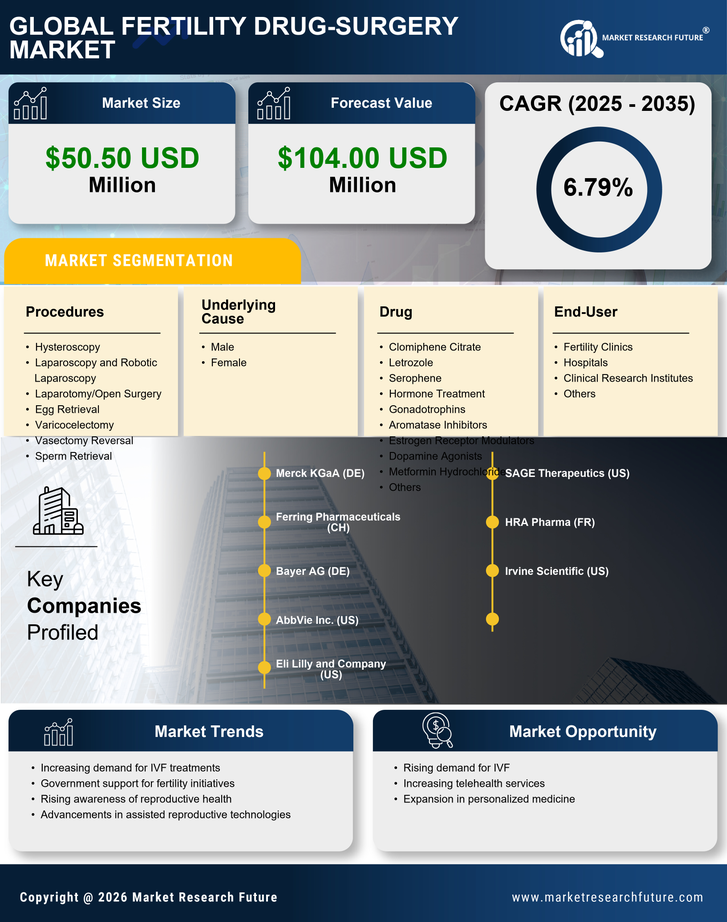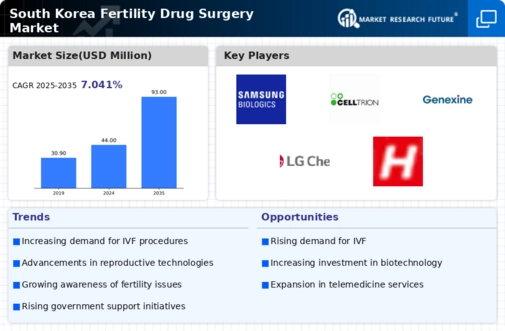Rising Incidence of Infertility
The rising incidence of infertility in South Korea serves as a significant driver for the fertility drug-surgery market. Factors such as delayed childbearing, lifestyle changes, and environmental influences contribute to this trend. Recent statistics indicate that around 1 in 6 couples in South Korea face infertility challenges, which has led to a growing need for effective treatment solutions. As the population grapples with these issues, the demand for fertility drugs and surgical procedures is expected to increase. This trend suggests that the fertility drug-surgery market will continue to expand, as healthcare providers respond to the needs of couples seeking assistance in their journey to parenthood.
Supportive Regulatory Environment
A supportive regulatory environment plays a pivotal role in shaping the fertility drug-surgery market. In South Korea, government policies and regulations have been established to promote fertility treatments and ensure patient safety. Initiatives such as subsidies for fertility treatments and the establishment of guidelines for clinics contribute to a more accessible healthcare landscape. This regulatory support encourages investment in the fertility drug-surgery market, as healthcare providers are more likely to expand their services and adopt new technologies. Consequently, the fertility drug-surgery market is poised for growth, driven by a favorable regulatory framework that prioritizes reproductive health.
Cultural Shifts Towards Family Planning
Cultural shifts towards family planning are influencing the fertility drug-surgery market in South Korea. As societal norms evolve, there is a growing acceptance of assisted reproductive technologies among younger generations. This shift is reflected in the increasing number of couples opting for fertility treatments, as they seek to balance career aspirations with family planning. The fertility drug-surgery market is likely to benefit from this trend, as more individuals view fertility treatments as viable options rather than stigmatized choices. This cultural transformation may lead to a sustained increase in demand for fertility drugs and surgical interventions, further propelling market growth.
Increasing Awareness of Fertility Issues
The growing awareness of fertility issues among the population is a crucial driver for the fertility drug-surgery market. Educational campaigns and media coverage have highlighted the challenges faced by couples trying to conceive, leading to a surge in consultations with fertility specialists. In South Korea, approximately 15% of couples experience infertility, prompting many to seek medical assistance. This heightened awareness has resulted in increased demand for fertility drugs and surgical interventions, as individuals become more proactive in addressing their reproductive health. The fertility drug-surgery market is likely to benefit from this trend, as more people recognize the importance of early intervention and the available treatment options.
Advancements in Reproductive Technologies
Advancements in reproductive technologies are transforming the landscape of the fertility drug-surgery market. Innovations such as in vitro fertilization (IVF), intracytoplasmic sperm injection (ICSI), and preimplantation genetic testing have enhanced the success rates of fertility treatments. In South Korea, the success rate of IVF has improved to approximately 40%, encouraging more couples to pursue these options. These technological advancements not only increase the effectiveness of treatments but also expand the range of services offered by fertility clinics. As a result, the fertility drug-surgery market is likely to experience growth as patients seek out the latest and most effective reproductive technologies.
















